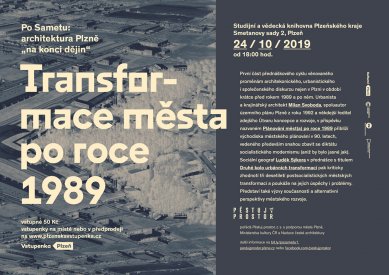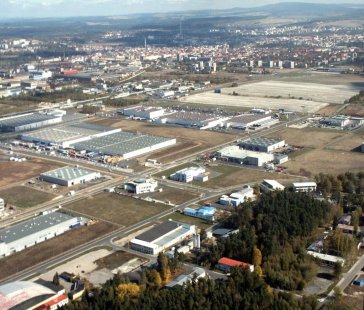
After the Summit: a cycle about the architecture and urbanism of Pilsen
Source
Petr Klíma, Pěstuj prostor, z.s.
Petr Klíma, Pěstuj prostor, z.s.
Publisher
Tisková zpráva
21.10.2019 18:55
Tisková zpráva
21.10.2019 18:55
Czech Republic
Pilsen
The recently held program of the Plzeň section of the 9th year of the Architecture Day festival, subtitled After the Velvet Revolution or Plzeň "at the end of history,” is traditionally followed by a lecture series organized by the Pěstuj prostor association. The cycle follows and develops the defined theme - in this case, the changes in architectural, urbanistic, and social discourse not only in Plzeň in the period shortly before and after 1989. The first part of the series, during which urban planner and landscape architect Milan Svoboda and social geographer Luděk Sýkora will present their contributions, will take place on Thursday, October 24, 2019, at 6 PM at the Study and Scientific Library of the Plzeň Region.
Milan Svoboda, co-author of the spatial plan for Plzeň from 1992 and former director of the city's Concept and Development Department, will present a lecture titled City Planning(s) after 1989, which will outline the foundations of urban planning in the 1990s. In 1992, a time characterized by freedom, creativity, and also naivety, work began on a new spatial plan for the city of Plzeň. “According to Milan Svoboda, the preparation of the document was driven by an effort to free itself from the dictation of modernism in its socialist, i.e., Czechoslovak form, without actually knowing how to do it,” states Petr Klíma from the organizing association. A thorough change in city planning was then hindered by a number of external and internal factors, which only fully manifested over time. One of them was the minimal understanding of urban planners about the strength of the influence of the private sector and economic players exerting their interests even through political representation. The second was the building law from 1976, which defined the method of spatial planning in terms of land use, which according to Svoboda is a stigma of the past that we have not yet shaken off.
Professor Luděk Sýkora will critically assess three decades of post-socialist urban transformations in his lecture titled The Second Round of Urban Transformations, pointing out their successes and problems. He will recall the thesis of German-British sociologist, political scientist, and philosopher Ralf Dahrendorf, who emphasized in 1990 that to create a stable and well-functioning society in former socialist countries, at least sixty years would be needed. Therefore, we are only at halftime in the transformation. “In his contribution, Professor Sýkora will also present the challenges of the present and alternative perspectives on urban development,” adds Petr Klíma.
Admission to the event is 50 CZK. The next part of the series After the Velvet Revolution: Architecture of Plzeň "at the end of history” will take place on Wednesday, November 6, 2019, at 6 PM in the former apartment of Willy and Gertrude Kraus, one of the so-called Loos interiors. Architectural historian Michaela Janečková and anthropologist Michal Lehečka will give lectures dedicated to housing estates and life in them.
The series is organized by the Pěstuj prostor association with the support of the city of Plzeň, the Ministry of Culture of the Czech Republic, the State Fund for Culture of the Czech Republic, and the Foundation for Czech Architecture. Its goal is to support and develop interest among local experts and the broader public in architecture and the built and landscape environment of the city.
RNDr. Milan Svoboda
He studied ecology and environmental protection at the Faculty of Science of Charles University in Prague. After his studies, he dedicated himself to landscape planning, landscape architecture, spatial planning, and strategic planning. From 1992 to 2007, he worked in the Concept and Development Department of the city of Plzeň, which he directed from 2001. He utilized his experience in managing a city organization while leading the Plzeň 2015 team during the city's candidacy for the title of European Capital of Culture 2015 and during the establishment of the Plzeň 2015 company. He is the author and co-author of numerous urban and spatial planning documents and landscape architecture projects. He collaborates with the Faculty of Architecture at the Czech Technical University in Prague and is a consultant for the research task "Methodology for Assigning Spatial Plans." He has published numerous contributions in the fields of spatial planning and spatial development.
prof. RNDr. Luděk Sýkora, Ph.D.
He serves as a professor in the Department of Social Geography and Regional Development at the Faculty of Science of Charles University in Prague. He focuses on the transformations of post-socialist cities and their spatial structures and settlement systems, with an emphasis on metropolitan areas. He primarily examines the processes of suburbanization and residential segregation and their risky societal consequences.
Facebook event >
Milan Svoboda, co-author of the spatial plan for Plzeň from 1992 and former director of the city's Concept and Development Department, will present a lecture titled City Planning(s) after 1989, which will outline the foundations of urban planning in the 1990s. In 1992, a time characterized by freedom, creativity, and also naivety, work began on a new spatial plan for the city of Plzeň. “According to Milan Svoboda, the preparation of the document was driven by an effort to free itself from the dictation of modernism in its socialist, i.e., Czechoslovak form, without actually knowing how to do it,” states Petr Klíma from the organizing association. A thorough change in city planning was then hindered by a number of external and internal factors, which only fully manifested over time. One of them was the minimal understanding of urban planners about the strength of the influence of the private sector and economic players exerting their interests even through political representation. The second was the building law from 1976, which defined the method of spatial planning in terms of land use, which according to Svoboda is a stigma of the past that we have not yet shaken off.
Professor Luděk Sýkora will critically assess three decades of post-socialist urban transformations in his lecture titled The Second Round of Urban Transformations, pointing out their successes and problems. He will recall the thesis of German-British sociologist, political scientist, and philosopher Ralf Dahrendorf, who emphasized in 1990 that to create a stable and well-functioning society in former socialist countries, at least sixty years would be needed. Therefore, we are only at halftime in the transformation. “In his contribution, Professor Sýkora will also present the challenges of the present and alternative perspectives on urban development,” adds Petr Klíma.
Admission to the event is 50 CZK. The next part of the series After the Velvet Revolution: Architecture of Plzeň "at the end of history” will take place on Wednesday, November 6, 2019, at 6 PM in the former apartment of Willy and Gertrude Kraus, one of the so-called Loos interiors. Architectural historian Michaela Janečková and anthropologist Michal Lehečka will give lectures dedicated to housing estates and life in them.
The series is organized by the Pěstuj prostor association with the support of the city of Plzeň, the Ministry of Culture of the Czech Republic, the State Fund for Culture of the Czech Republic, and the Foundation for Czech Architecture. Its goal is to support and develop interest among local experts and the broader public in architecture and the built and landscape environment of the city.
RNDr. Milan Svoboda
He studied ecology and environmental protection at the Faculty of Science of Charles University in Prague. After his studies, he dedicated himself to landscape planning, landscape architecture, spatial planning, and strategic planning. From 1992 to 2007, he worked in the Concept and Development Department of the city of Plzeň, which he directed from 2001. He utilized his experience in managing a city organization while leading the Plzeň 2015 team during the city's candidacy for the title of European Capital of Culture 2015 and during the establishment of the Plzeň 2015 company. He is the author and co-author of numerous urban and spatial planning documents and landscape architecture projects. He collaborates with the Faculty of Architecture at the Czech Technical University in Prague and is a consultant for the research task "Methodology for Assigning Spatial Plans." He has published numerous contributions in the fields of spatial planning and spatial development.
prof. RNDr. Luděk Sýkora, Ph.D.
He serves as a professor in the Department of Social Geography and Regional Development at the Faculty of Science of Charles University in Prague. He focuses on the transformations of post-socialist cities and their spatial structures and settlement systems, with an emphasis on metropolitan areas. He primarily examines the processes of suburbanization and residential segregation and their risky societal consequences.
Facebook event >
The English translation is powered by AI tool. Switch to Czech to view the original text source.


0 comments
add comment
Related articles
0
10.11.2022 | Martina Hrabová: František Sammer - architect of bold visions
0
28.11.2019 | After the Summit: Jana Pavlová and Adéla Gjuričová
0
14.11.2019 | After the Summit: Hubert Guzik and Barbora Vacková
0
30.10.2019 | After the Summit: Michaela Janečková and Michal Lehečka
0
19.01.2016 | Cultivate Space 2016 - Open Call
0
09.11.2015 | Finale of the exhibition Grow Space 2012-2015









